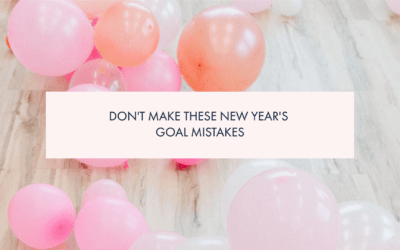There are many reasons why so many of us fail to stick to the goals that we set ourselves.
But a really big one is that quite often, we set goals based on what we want to happen, as opposed to what we’re going to do.
And you might be thinking, isn’t that the way it’s supposed to be?
Aren’t I supposed to set goals like “double my sales” or “get 5 new wholesale retailers?”
If I don’t visualise the things that I want, how am I actually going to get them?
And of course, you need to know what you want and where you would like your life and business to end up.
But if you’ve ever set these kinds of goals, you will know that when you sit down to DO doubling your sales, you probably get stuck on what exactly you should do.
Because goals require ACTION. In order to make a goal happen you have to DO something.
And with these types of goals you haven’t decided what you’re going to do to make it happen, and so often the time that should be spent working on the goal is spent on either making that decision or agonising over it.
There’s a crucial part of the puzzle missing.
When you set goals, it’s about more than just setting out what you want. It’s also about planning how to get there.
To do that you need both Outcome goals and Process goals.
So what’s the difference and why do you need both?
An outcome goal is a goal that is based around something happening – around an outcome.
It might be that you want to reach a certain dollar amount of sales, or it might be that you want to reach a set number of followers on social media or subscribers on your email list.
Or it might be that you want to feel a certain way.
I want to feel more organised, or I want to be more confident in selling my work, or I want to feel prepared and calm before my next show.
It’s about something that you want to happen, but that you are not 100% in control of.
Ultimately you cannot control whether anyone buys from you, or stocks your work. You can only control the things you do to make it more likely.
Outcome goals are really important because they are connected to our desires about how we want our life and our business to be, and that’s really where all goals should start – with what we most want for ourselves.
But it is only a starting place, because we can’t DO any of these things.
When we sit down to achieve our goal of “feeling more organised” we get stuck. Because we now have to choose what to do, and usually we haven’t thought about that part.
But our brains are ready to “do” our goal and we feel immediately stuck. That’s the friction that leaves us running for Instagram or YouTube for “inspiration” and then suddenly we’ve lost a ton of time and we start to feel more and more behind.
So we need to be aware of our outcome goals, of the things that we most want, but our monthly and weekly goals should be something that we can actually DO.
That’s where Process goals come in.
Process goals are based around completing a measurable action, meaning that at the end of a certain period of time you can say whether you’ve completed the goal or not.
For example:
“Get 5 more stockists” is an outcome goal
“Email 20 potential new stockists” is a process goal
We don’t control whether we get 5 more stockists. No matter what we do, it may or may not happen.
But we can absolutely control whether we pitch to 20 potential new stockists or not. And by doing so, we’re giving ourselves a really good chance of getting more stockists. Hopefully 5, maybe more.
Process goals are something you can DO.
But why does it even matter if they end up achieving the same thing?
When you sit down to achieve an outcome goal, there’s a lot of places for your mind to go. A lot of places where you could get distracted or overwhelmed, or start comparing yourself to others.
And that makes it ultimately take longer for you to achieve your goal.
When you set a process goal, there is nothing to be decided when you sit down to work. Nowhere to get overwhelmed or confused.
You just need to do the thing. And it’s easy to identify whether you did the thing or not.
If I were to ask you at the end of this week if you completed your goal to “feel more confident,” you probably couldn’t give me a straight yes or no answer, and even if you could, it would likely only be a temporary state.
Most likely, you’d say that you’re getting there, or you’re feeling a bit better, but that probably wouldn’t last. And if I asked you what you had DONE to work on this goal, you might say things like I read some books and I did some journalling and I looked at some courses on marketing because that’s where I feel least confident.
The problem is that this is a goal that’s going to take some time to achieve. You can’t just “feel more confident” in a week – at least not in a way that is going to be long term.
So you probably did too much work on it this week, maybe putting aside some other things you should have been doing, and then you won’t do enough work on it in future, because the other work will seem more important.
Outcome goals need process goals to go from a dream to a plan of action.
But let’s look at what might have happened if you had taken your outcome goal of feeling more confident, and created a process goal to do something that would make you much more likely to achieve the outcome.
Maybe you set yourself a process goal to spend an hour this week putting together a list of business and mindset books, particularly focused on confidence.
You might look for books on money mindset if you don’t feel confident in your pricing and imposter syndrome if you don’t feel confident in your marketing.
And then you set another process goal to spend 2 hours a week, reading these books, and 10 minutes each day journalling on how you feel about yourself as a business owner.
If I were to ask you on Friday if you had completed your goal, you would be able to tell me yes or no.
And if the answer is no, then we can figure out why it didn’t happen. Maybe you didn’t decide WHEN you were going to do it and so it just got pushed out by other work.
Then next week you can make sure you set aside specific times for doing this.
When you set a goal like this, you’re much more likely to achieve it because you’ve figured out how, before you start. You’ve figured out what you’re going to try.
The planning out of the activities you will do is part of the goal setting process, instead of part of the action taking process, which means it doesn’t interrupt the action.
Process goals also help to keep us working regularly on something that is going to take longer
When you’ve given yourself something specific that you can do, over the next few weeks to make it much more likely that you’ll achieve your outcome goal, it’s easier to track your progress and prevent your efforts from becoming all or nothing.
You’re not diving all in this week, neglecting too many other things, and then doing not much about it for the next six months.
You’re steadily working towards an outcome that matters to you, in a way that doesn’t feel overwhelming or confusing. You just show up, do what you’ve decided (or don’t do it and figure out why) and then get the rest of your work done.
So the process goal is what makes the outcome goal happen.
It’s really important that you KNOW your outcome goals, but you SET process goals.
You know what you’re working towards, but the goals you set need to be about what you’re actually going to do.
For anything that we want to do, we have to decide how we’re going to achieve it and that’s where most of us get stuck. Because there are usually a lot of options.
Deciding what we’re going to try is part of setting the goal, and that work shouldn’t get pushed into the time that you spend working on the goal.
This difference between process and outcome goals is a really key thing to understand so that you can move from thinking about your goals, and hoping for specific outcomes to actually doing the work to make them happen.
Because for most of us, when we think we’re doing the work we’re actually not.
Let’s take an example.
If you’re trying to grow your Instagram followers (an outcome goal) but you don’t set any process goals around what you’re actually going to do, you can end up sitting down to write posts, getting distracted or bored, going on to Instagram to look for ideas and then getting disappointed that everyone seems to be doing better than you.
This feels like work, but it isn’t.
Whereas if you take it further and set yourself a process goal to help you grow your Instagram followers, you have to decide what you’re going to do with your time.
And just doing that makes you think about how you’re going to achieve the goal.
Maybe you’ll decide that your process goal is just to post 5 times this week, because you’ve been inconsistent and you just need to get started.
You know that this probably won’t gain you many followers this week, but it’s a place to start.
You just need to start by getting back into the habit of regularly posting and you know you can find 5 things to say and just get them done.
Or maybe you’ll decide that the way to get new followers is to get your posts or your work seen by more people, so maybe you’ll decide to host a giveaway where your followers will post about your products to enter.
Or maybe you’ll create some Stories and tag in some bigger brands to try to get them to share your posts with their audience, and see if that helps to get people following you.
Or maybe you’ll spend 10 minutes a day engaging with posts from people who could be potential customers, or with their comments on other brands’ pages.
As soon as you start thinking “what can I do to get the outcome I want?” you move away from “it’s so hard and I’m so confused” to “let’s try this and see what happens.”
And the important part is that you can actually measure what you’ve been doing.
Because for the majority of people who say that they’re struggling to get sales, or to get followers, or some other outcome goal, if I ask what they’ve been trying, they usually can’t answer very clearly.
That means that those process goals are missing and what they may have been doing is putting a lot of effort into thinking, and worrying and consuming other people’s content, but not enough time into testing things and learning from the results.
Setting a goal is a much more of a complex and thoughtful process than just thinking about what you want and blindly setting off in search of it.
Deciding what we’re going to actually do, is as much as part of it as the ultimate destination and without this part, it’s all too easy to just let your important but not urgent goal fall to the bottom of your to do list and eventually disappear altogether.








